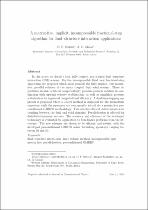 ResearchSpace
ResearchSpace
A matrix-free, implicit, incompressible fractional-step algorithm for fluid–structure interaction applications
JavaScript is disabled for your browser. Some features of this site may not work without it.
- ResearchSpace
- →
- Research Publications/Outputs
- →
- Journal Articles
- →
- View Item
| dc.contributor.author |
Oxtoby, Oliver F

|
|
| dc.contributor.author |
Malan, AG

|
|
| dc.date.accessioned | 2012-06-18T08:23:09Z | |
| dc.date.available | 2012-06-18T08:23:09Z | |
| dc.date.issued | 2012-05 | |
| dc.identifier.citation | Oxtoby, OF and Malan, AG. 2012. A matrix-free, implicit, incompressible fractional-step algorithm for fluid–structure interaction applications. Journal of Computational Physics, vol. 231(16), pp 5389-5405 | en_US |
| dc.identifier.issn | 0021-9991 | |
| dc.identifier.uri | http://www.sciencedirect.com/science/article/pii/S0021999112002197 | |
| dc.identifier.uri | http://hdl.handle.net/10204/5915 | |
| dc.description | Copyright: 2012 Elsevier. This is the pre-print version of the work. The definitive version is published in Journal of Computational Physics, vol. 231(16), pp 5389-5405 | en_US |
| dc.description.abstract | In this paper we detail a fast, fully-coupled, partitioned fluid–structure interaction (FSI) scheme. For the incompressible fluid, new fractional-step algorithms are proposed which make possible the fully implicit, but matrixfree, parallel solution of the entire coupled fluid–solid system. These algorithms include artificial compressibility pressure-poisson solution in conjunction with upwind velocity stabilisation, as well as simplified pressure stabilisation for improved computational efficiency. A dual-timestepping approach is proposed where a Jacobi method is employed for the momentum equations while the pressures are concurrently solved via a matrix-free preconditioned GMRES methodology. This enables efficient sub-iteration level coupling between the fluid and solid domains. Parallelisation is effected for distributed-memory systems. The accuracy and efficiency of the developed technology is evaluated by application to benchmark problems from the literature. The new schemes are shown to be efficient and robust, with the developed preconditioned GMRES solver furnishing speed-ups ranging between 50 and 80. | en_US |
| dc.language.iso | en | en_US |
| dc.publisher | Elsevier | en_US |
| dc.relation.ispartofseries | Workflow;9133 | |
| dc.subject | Fluid–structure interaction | en_US |
| dc.subject | Finite volume method | en_US |
| dc.subject | Incompressible split | en_US |
| dc.subject | Matrix free | en_US |
| dc.subject | Parallelization | en_US |
| dc.subject | Preconditioned GMRES | en_US |
| dc.title | A matrix-free, implicit, incompressible fractional-step algorithm for fluid–structure interaction applications | en_US |
| dc.type | Article | en_US |
| dc.identifier.apacitation | Oxtoby, O. F., & Malan, A. (2012). A matrix-free, implicit, incompressible fractional-step algorithm for fluid–structure interaction applications. http://hdl.handle.net/10204/5915 | en_ZA |
| dc.identifier.chicagocitation | Oxtoby, Oliver F, and AG Malan "A matrix-free, implicit, incompressible fractional-step algorithm for fluid–structure interaction applications." (2012) http://hdl.handle.net/10204/5915 | en_ZA |
| dc.identifier.vancouvercitation | Oxtoby OF, Malan A. A matrix-free, implicit, incompressible fractional-step algorithm for fluid–structure interaction applications. 2012; http://hdl.handle.net/10204/5915. | en_ZA |
| dc.identifier.ris | TY - Article AU - Oxtoby, Oliver F AU - Malan, AG AB - In this paper we detail a fast, fully-coupled, partitioned fluid–structure interaction (FSI) scheme. For the incompressible fluid, new fractional-step algorithms are proposed which make possible the fully implicit, but matrixfree, parallel solution of the entire coupled fluid–solid system. These algorithms include artificial compressibility pressure-poisson solution in conjunction with upwind velocity stabilisation, as well as simplified pressure stabilisation for improved computational efficiency. A dual-timestepping approach is proposed where a Jacobi method is employed for the momentum equations while the pressures are concurrently solved via a matrix-free preconditioned GMRES methodology. This enables efficient sub-iteration level coupling between the fluid and solid domains. Parallelisation is effected for distributed-memory systems. The accuracy and efficiency of the developed technology is evaluated by application to benchmark problems from the literature. The new schemes are shown to be efficient and robust, with the developed preconditioned GMRES solver furnishing speed-ups ranging between 50 and 80. DA - 2012-05 DB - ResearchSpace DP - CSIR KW - Fluid–structure interaction KW - Finite volume method KW - Incompressible split KW - Matrix free KW - Parallelization KW - Preconditioned GMRES LK - https://researchspace.csir.co.za PY - 2012 SM - 0021-9991 T1 - A matrix-free, implicit, incompressible fractional-step algorithm for fluid–structure interaction applications TI - A matrix-free, implicit, incompressible fractional-step algorithm for fluid–structure interaction applications UR - http://hdl.handle.net/10204/5915 ER - | en_ZA |





